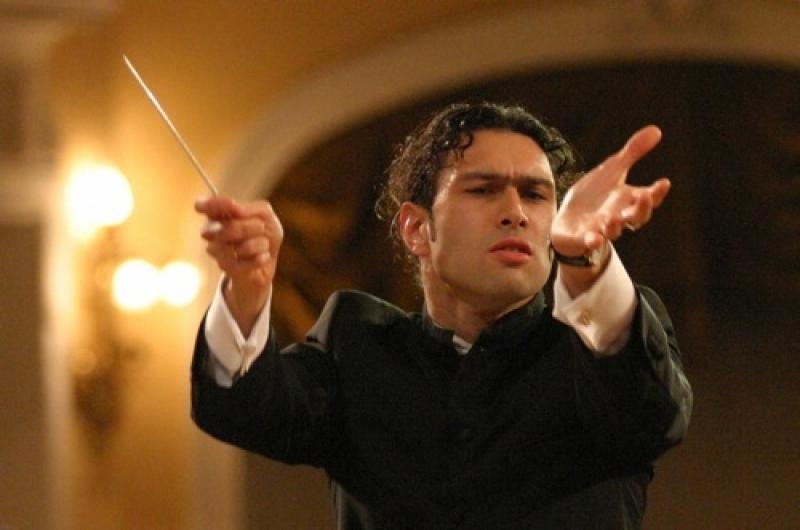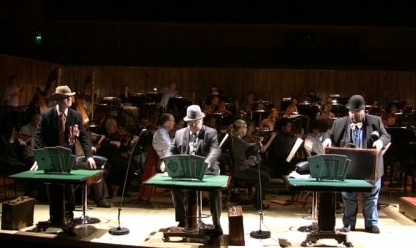LPO, Jurowski, Royal Festival Hall | reviews, news & interviews
LPO, Jurowski, Royal Festival Hall
LPO, Jurowski, Royal Festival Hall
Precocity of young Shostakovich and his absurd sense of humour

This is the fifth time on theartsdesk that a review has been headed as above - so you must be thinking it had better be justified or bribery will be suspected. But it's not just the phosphorescent fascination that flickers around the charismatic young LPO principal conductor Vladimir Jurowski that draws the crowds, it is his inquiring programming. Last night it was another of those games that one couldn’t resist, if a game, in the end, of two halves.
An all-Shostakovich evening, a young, vibrant prodigy on show, with his first symphony sandwiched by two satirical operatic confections - that area of musical theatre in which Shostakovich fired so brilliantly so young and then abandoned so decisively after his condemnation by Stalin. Both were based on the surreal ideas of Nikolai Gogol: The Nose (in which a man’s nose walks off his face during the night and becomes a civic bigwig) and The Gamblers (in which a gambling addict gets involved in a poker game and then... Shostakovich realised his mistake and gave up after Act 1).
What last night’s showing proved was not only the infectiousness of Jurowski's musicmaking - his curious Hoffnungesque figure elongated, demonic, with stick-like arms and control freak fingers spelling out every sound he wants from the apparently mesmerised LPO - but the awesome charm and brilliance of the student Shostakovich. The first symphony, written as a graduation piece when he was 18, is a tour de force by a young man giddy with his own precocity. It’s exhibitionism of a very high order, flamboyantly laying out instruments one by one, setting colours and textures down like a graphic poster artist, and three of its four movements have a worldly exuberance and sprung danceability that reminds one that in the 1920s the new Revolutionary Russia was at a high pitch of optimism and discovery (Stalin had not as yet destroyed his opposition, and there was unfettered experimentalism in film, art and theatre).
But inside this appealing teenage bombast comes an expansive, sustained Largo where the depth of feeling is a surprise in so young a man, especially when its plangent melody is passed from the opening oboe (always a deceiving instrument) to the more naked, vulnerable cello. Some people wonder if this lamentation is assumed, a PR exercise to impress his teachers with his mastery of slow movement - perhaps, but Jurowski took it, it seemed to me, at face value, as the music of a youth bursting with a sadness that he can’t explain.
The Nose, his first opera, came soon after this stunning start to his career, crazy in every way, from its Monty Python plot involving 80 singers to an astonishing episode of pure percussion banging. Given its bizarre defiance of sense, its deep and almost impenetrable (at its time) satire, and the huge logistical challenges of it, Shostakovich thoughtfully made a little trailer suite beforehand to sell it to the public. It’s a perfect appetiser, zingy and tantalising, its sheer noise and daredevil attitude thrilling rather than overblown (which the complete opera was when Gergiev brought the Mariinsky’s staid production three years ago).
The brassily coloured start with trumpet and trombone announces that this will not be a subtle aural experience, nor a particularly compassionate one - and once Major Platon Kuzmich Kovalyov starts lamenting the disappearance of his nose, and his aggrievedness that it has become a political dignitary far outranking him, we could be thankful for Sergei Leiferkus’s still elastic and highly expressive baritone inviting us by expert nuances to vote for this pompous little man’s nose, rather than for him.
 Mikhail Urusov, a magnificently loud tenor, belted out the servant’s heavy-booted love-song like a trombone himself, with more effect than when taking on the main role in the second operatic suite of the evening, The Gamblers. This is the surviving first act of a 1942 opera in which Shostakovich decided to redeem himself for his free adaptation of Gogol in The Nose, and this time to set every word of the author’s play about greed and vanity. He gave up after Act 1 when he realised the whole opera could be six hours long. Praise be - the first act is elephantine, even with the white heat of the LPO/Jurowski team fully beamed upon it.
Mikhail Urusov, a magnificently loud tenor, belted out the servant’s heavy-booted love-song like a trombone himself, with more effect than when taking on the main role in the second operatic suite of the evening, The Gamblers. This is the surviving first act of a 1942 opera in which Shostakovich decided to redeem himself for his free adaptation of Gogol in The Nose, and this time to set every word of the author’s play about greed and vanity. He gave up after Act 1 when he realised the whole opera could be six hours long. Praise be - the first act is elephantine, even with the white heat of the LPO/Jurowski team fully beamed upon it.
A decision had been made by Irina Brown (recent director of the RSAMD War and Peace restaging) to resurrect the fragment’s theatrical intentions by having the men sitting at card-tables (and Jurowski playing cards too, before it started). I am not convinced any effort could save this. Musically it’s hamstrung since all the characters are male and Shostakovich makes most of the voices bass or bass-baritone, while much of the orchestration is also rootling about in the nether regions - tuba, bassoon, double bass, bass balalaika.
Gravelly can be good (as in a comic bass duet between the two servants, Vladimir Ognev and Mikhail Petrenko trying to one-up each other with the number of staff in their masters’ houses), but it becomes tedious when dry, verbose stories of poker games are fed out word by word in recitative at a steady route-march pace. Even Jurowski’s electric body-language seemed to mortify into dutifulness, as if he too realised this selling job of a part-built masterpiece was actually only demonstrating why its maker lost heart.
- Next LPO/Jurowski concert is on 28 April with Prokofiev and Myaskovsky. Jurowski is no longer conducting the 28 May concert advertised.
- Check out what's on in the Southbank Centre's 2010-11 season
Add comment
The future of Arts Journalism
You can stop theartsdesk.com closing!
We urgently need financing to survive. Our fundraising drive has thus far raised £33,000 but we need to reach £100,000 or we will be forced to close. Please contribute here: https://gofund.me/c3f6033d
And if you can forward this information to anyone who might assist, we’d be grateful.

Subscribe to theartsdesk.com
Thank you for continuing to read our work on theartsdesk.com. For unlimited access to every article in its entirety, including our archive of more than 15,000 pieces, we're asking for £5 per month or £40 per year. We feel it's a very good deal, and hope you do too.
To take a subscription now simply click here.
And if you're looking for that extra gift for a friend or family member, why not treat them to a theartsdesk.com gift subscription?
more Classical music
 Braimah Kanneh-Mason, Fernandes, Gent, 229 review - a beguiling trip around the world
Engagingly humble and empathetic work from three talented musicians
Braimah Kanneh-Mason, Fernandes, Gent, 229 review - a beguiling trip around the world
Engagingly humble and empathetic work from three talented musicians
 Manchester Collective, RNCM review - something special in new music
Performers of extraordinary versatility fulfil their brief
Manchester Collective, RNCM review - something special in new music
Performers of extraordinary versatility fulfil their brief
 Classical CDs: Elephants, bells and warm blankets
Two great conductors celebrated, plus medieval choral music and an eclectic vocal recital
Classical CDs: Elephants, bells and warm blankets
Two great conductors celebrated, plus medieval choral music and an eclectic vocal recital
 Widmann, LSO, Pappano, Barbican review - razor-sharp attack in adrenalin charges
A great conductor continues his scorching survey of British symphonies with a hard-hitter
Widmann, LSO, Pappano, Barbican review - razor-sharp attack in adrenalin charges
A great conductor continues his scorching survey of British symphonies with a hard-hitter
 Nakariakov, SCO, Emelyanychev, Queen's Hall, Edinburgh review - a frenzied feast of contemporary classics
'New Dimensions' concerts continue to flourish
Nakariakov, SCO, Emelyanychev, Queen's Hall, Edinburgh review - a frenzied feast of contemporary classics
'New Dimensions' concerts continue to flourish
 Biss, BBCSO, Hrůša, Barbican review - electrifying Shostakovich at a crucial time
The Royal Opera's next music director achieves blazing results in a rich programme
Biss, BBCSO, Hrůša, Barbican review - electrifying Shostakovich at a crucial time
The Royal Opera's next music director achieves blazing results in a rich programme
 BBC Singers, Aurora Orchestra, Collon, Kings Place review - on the way to heaven via King's Cross
Intimate settings for a musical journey towards bliss
BBC Singers, Aurora Orchestra, Collon, Kings Place review - on the way to heaven via King's Cross
Intimate settings for a musical journey towards bliss
 Classical CDs: Mandolins, trumpets and hot soup
French chamber music, Viennese waltzes and a disc of viola duets
Classical CDs: Mandolins, trumpets and hot soup
French chamber music, Viennese waltzes and a disc of viola duets
 RAM Song Circle, Wigmore Hall review - excellent young musicians lift the spirits
Royal Academy singers revel in merry monks, mourning mothers and morose musings
RAM Song Circle, Wigmore Hall review - excellent young musicians lift the spirits
Royal Academy singers revel in merry monks, mourning mothers and morose musings
 Gigashvili, Hallé, Cox, Bridgewater Hall, Manchester review - beauty and style from a winning pianist
Music and ‘noise’ come together as new music meets Mozart and Tchaikovsky
Gigashvili, Hallé, Cox, Bridgewater Hall, Manchester review - beauty and style from a winning pianist
Music and ‘noise’ come together as new music meets Mozart and Tchaikovsky
 Giltburg, Pavel Haas Quartet, Wigmore Hall review - into the labyrinth of a Martinů masterpiece
Fierce Czech first half followed by more storm but also balm in Brahms
Giltburg, Pavel Haas Quartet, Wigmore Hall review - into the labyrinth of a Martinů masterpiece
Fierce Czech first half followed by more storm but also balm in Brahms

Comments
...
...